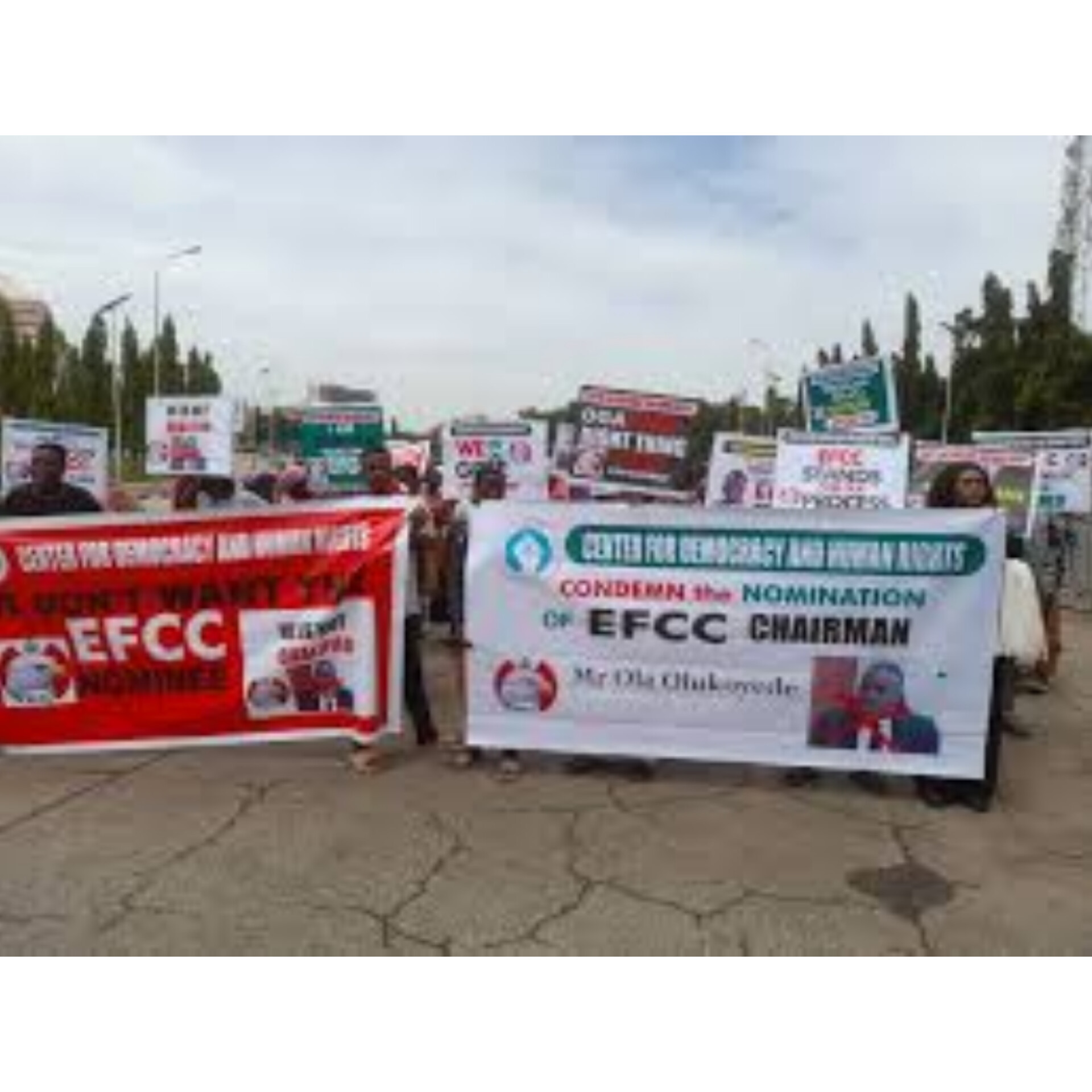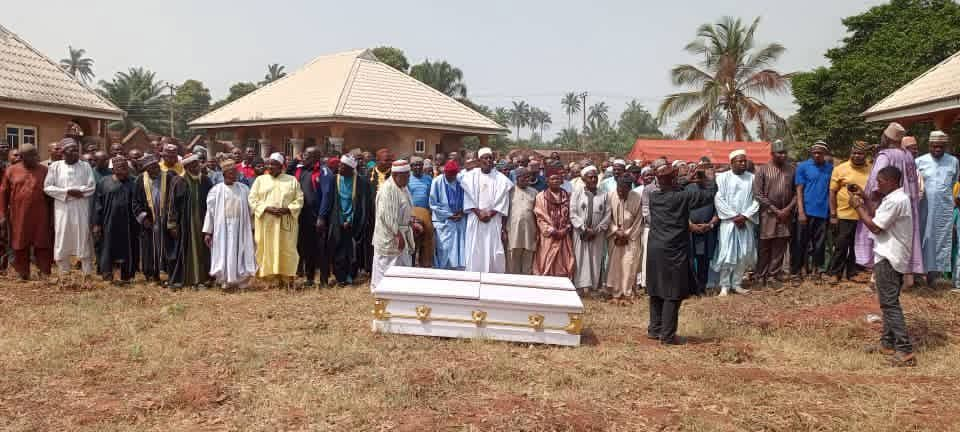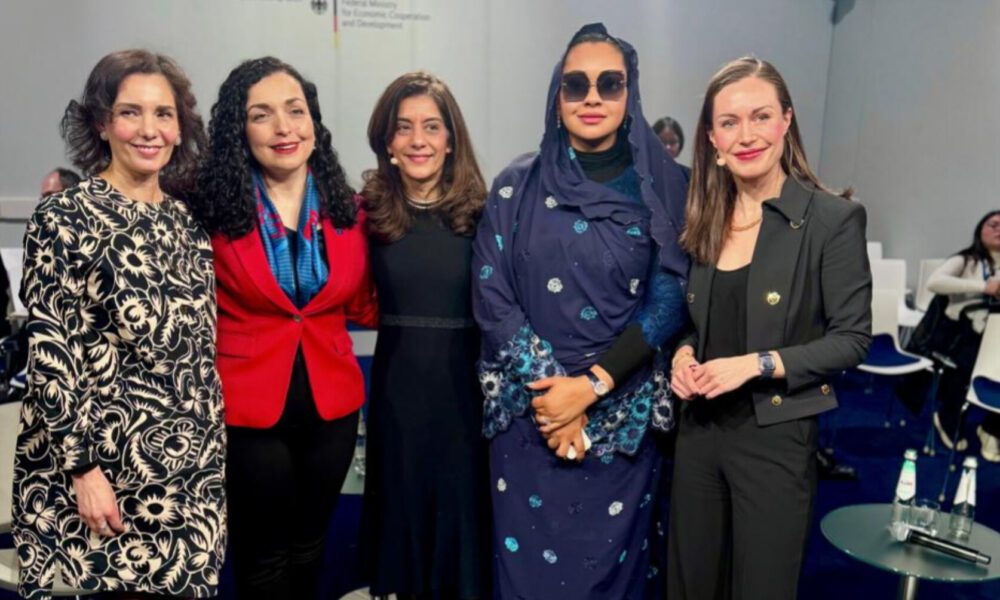A group Centre for Democracy and Human Rights (CEDEHUR).on Tuesday stormed the National Assembly gate to protest against the appointment of Mr. Ola Olukoyede as Chairman of the Economic and Financial Crimes Commission (EFCC).
Armed with their protest letter titled “Petition on the Recent Appointment of Mr. Ola Olukoyede as Chairman of the Economic and Financial Crimes Commission (EFCC) Contrary to the Extant Laws, the (Establishment) Act 2004 of the Commission” they sought to address the Senate President on Tuesday.
The petition signed by Adebayo Lion Ogorry (National Secretary) CEDEHUR said they wrote to draw the attention of the Senate President “to the gross violation of the extant law”, which is the EFCC Establishment Act (2004) by the President of the Federal Republic of Nigeria, His Excellency, President Bola Ahmed Tinubu in appointing Mr. Ola Olukayede as Chairman of the Commission on Thursday, October 12, 2023.
The group described the action of President Tinubu in making the appointment of Mr. Olukoyede into such a high office with enormous responsibility as the Chairman of the EFCC in fragrant breach of the provisions of the laws of the parliament as “contrary to the oath he took on May 29, 2023 to protect and defend the laws of the nation”.

Noting the importance of the EFCC Extant law as “sacrosanct” CEDEHUR underscored the need for it to be strictly adhered to before going ahead to appoint a chairman for the Commission.
“President Tinubu, as the number one citizen, whose office is the creation of the law, needs to comply with the EFCC Extant Laws and not be seen to set a wrong precedence for successive administrations in making his appointment, which can slip the country into a state of anarchy”.
The group said in their quest to see that the right thing is done, they have made its findings on who qualifies to be the Executive Chairman of the EFCC in accordance with the laws and came to the conclusion that the provision of the EFCC Establishment Act, 2004 (1): “The Commission shall consist of the following members-(a) A chairman, who shall- (1) be the Chief Executive and Accounting officer of the Commission, (ii) be a serving or retired member of any government security or law enforcement agency not below the rank of Assistant Commissioner of Police or equivalent; and (iii) Possess not less than 15 years cognate experience”.
“The provision above is very clear and unambiguous. The functions of the EFCC are not civil in nature. Hence it is a paramilitary organization. That is the rationale behind the inclusion of the police ranking system and its equivalent in other law enforcement agencies as one of the prerequisites for attaining the position of the Executive Chairman” CEDEHUR said.
“Secondly, the person sought to be appointed must not only be a member of the law enforcement family, he must also have 15 years cognate experience. In other words, the person must have the knowledge, skills and abilities in the professional law enforcement activity.
“This section simply means that not all members of the police force, other Forces and indeed the EFCC can be the Executive Chairman of the EFCC. A pilot, medical personnel, Admin officer, etc who have 15 years police or paramilitary service, are ordinarily devoid of the cognate experience of enforcing the laws of the EFCC.
“This much is gleaned from Section 8 (5) of the EFCC Act which states that: “…..all officers involved in the enforcement of the Act shall have the same powers, authorities, privileges (including power to bear arms) as are given by law to members of the Nigerian Police”.
“To further buttress this point, the EFCC simply identified the officers who are beneficiaries of Section 8 (5) of the EFCC Act and issued them with a warrant card. Evidently, the officers who do not possess a warrant card are not regarded as equivalent to police officers as envisioned by the EFCC Establishment Act.
“To put it in context, there are various members of the law enforcement agencies and Military organisations that are civilians and cannot take on the headship. Examples of these abound in the Nigerian Army and Nigerian Police Force. A person who serves in the EFCC as Chief of Staff (personal staff of the Chairman) or secretary has no law enforcement training as envisioned by the EFCC Act. Just like, the Inspector General of Police (IGP) may consider appointing a non-Police personnel in his office to carry out certain work.
“That does not make the civilian a member of the Police Force in the context of appointment to the headship. Also, a civilian Police pay officer who works with the Police does not become a member of the Police force in the context of appointment as IGP.
“Any appointment that is contrary to the provisions of the Extant EFCC Establishment Act is an assault on the National Assembly which is the constitutional organ responsible for making laws.
According to the petition, “if the Executive is uncomfortable with a provision, the appropriate action will be to beckon on the National Assembly to amend or repeal such provisions. To let such Infractions slide is a call to anarchy.
“From our investigation, he (Olukoyede) was appointed as Chief of staff to the erstwhile Chairman of the EFCC, Mr. Ibrahim Magu, and he served in that ⁷⁷⁶l from 2016 to 2018. He was later appointed the Commission Secretary and he served in that capacity from 2018 to 2019 before he was suspended from Office, and we gathered that same indicted both principal officers were never re-absorbed back to the Commission.
“Dramatically, Olukoyede has been appointed as the new Executive Chairman of EFCC, and we also gathered he was recently invited by the EFCC, and have been reliably informed that his offences has been written off, while his salaries and benefits suspended will be all paid while he was on suspension.
“In fact, we are all aware of Olukoyede spending eight years at the Commission between 2016 to 2023. We also queried that how did he manufactured additional 15 cognate years experience as contained in as required by law to as contained in Section 2 (1)(iii) of the Economic and Financial Crimes Commission Establishment Act, 2004.
“It is against this backdrop that we write the petition and calling you to use your office to give this appointment the proper scrutiny it deserves and stop the flagrant disregard and breach of the provisions of the extant laws of the EFCC Establishment Act 2004.
They expressed the believe the Senate will give their petition the “prompt action it deserves and save our nation from anarchy”.




